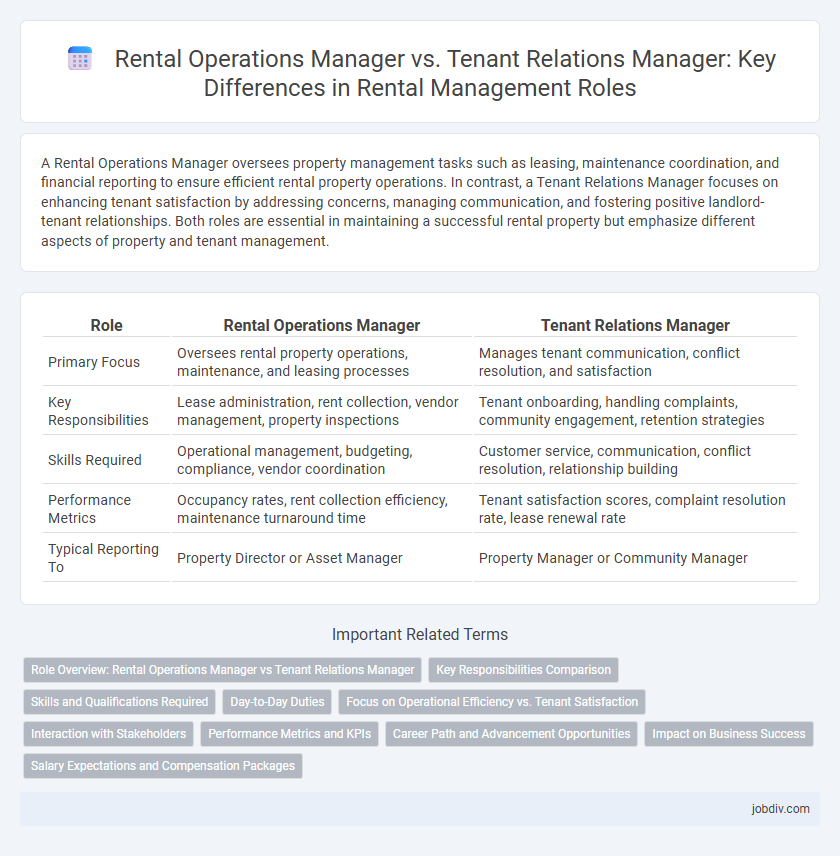A Rental Operations Manager oversees property management tasks such as leasing, maintenance coordination, and financial reporting to ensure efficient rental property operations. In contrast, a Tenant Relations Manager focuses on enhancing tenant satisfaction by addressing concerns, managing communication, and fostering positive landlord-tenant relationships. Both roles are essential in maintaining a successful rental property but emphasize different aspects of property and tenant management.
Table of Comparison
| Role | Rental Operations Manager | Tenant Relations Manager |
|---|---|---|
| Primary Focus | Oversees rental property operations, maintenance, and leasing processes | Manages tenant communication, conflict resolution, and satisfaction |
| Key Responsibilities | Lease administration, rent collection, vendor management, property inspections | Tenant onboarding, handling complaints, community engagement, retention strategies |
| Skills Required | Operational management, budgeting, compliance, vendor coordination | Customer service, communication, conflict resolution, relationship building |
| Performance Metrics | Occupancy rates, rent collection efficiency, maintenance turnaround time | Tenant satisfaction scores, complaint resolution rate, lease renewal rate |
| Typical Reporting To | Property Director or Asset Manager | Property Manager or Community Manager |
Role Overview: Rental Operations Manager vs Tenant Relations Manager
Rental Operations Managers oversee property management logistics, including lease administration, maintenance coordination, and financial reporting to maximize rental income and ensure regulatory compliance. Tenant Relations Managers focus on enhancing tenant satisfaction by addressing concerns, facilitating communication, and fostering community engagement to reduce turnover rates. Both roles collaborate to optimize property performance but emphasize operational efficiency versus tenant experience.
Key Responsibilities Comparison
Rental Operations Managers oversee property management logistics, including lease administration, maintenance coordination, and budgeting to ensure operational efficiency. Tenant Relations Managers specialize in fostering positive tenant experiences by addressing concerns, managing communications, and resolving disputes to enhance tenant satisfaction and retention. Both roles collaborate closely but differ in focus: operational management versus tenant engagement.
Skills and Qualifications Required
A Rental Operations Manager requires expertise in property management, budgeting, and regulatory compliance, along with strong leadership and analytical skills to oversee daily rental operations effectively. A Tenant Relations Manager must possess excellent communication, conflict resolution, and customer service skills to foster positive tenant interactions and ensure satisfaction. Both roles demand knowledge of rental laws and lease agreements, but the Rental Operations Manager leans more toward operational oversight, while the Tenant Relations Manager prioritizes maintaining tenant engagement and addressing concerns.
Day-to-Day Duties
Rental Operations Managers oversee property management logistics, including lease administration, maintenance coordination, and budgeting to ensure smooth daily operations. Tenant Relations Managers focus on enhancing tenant satisfaction by addressing tenant inquiries, resolving complaints, and facilitating communication between residents and property management teams. Both roles require strong organizational skills, but Rental Operations Managers prioritize operational efficiency while Tenant Relations Managers emphasize tenant experience and retention.
Focus on Operational Efficiency vs. Tenant Satisfaction
A Rental Operations Manager prioritizes operational efficiency by streamlining property maintenance, lease renewals, and rent collection processes to maximize profitability and minimize vacancies. In contrast, a Tenant Relations Manager centers on tenant satisfaction by addressing tenant concerns, fostering community engagement, and ensuring a positive living experience. Both roles contribute to property success but target different aspects: operational workflows versus tenant happiness.
Interaction with Stakeholders
A Rental Operations Manager oversees property management processes, coordinating with maintenance teams, vendors, and owners to ensure efficient facility upkeep and compliance with regulations. A Tenant Relations Manager prioritizes direct communication with tenants, addressing concerns, facilitating lease agreements, and enhancing tenant satisfaction to promote retention. Both roles require effective stakeholder engagement, but the Rental Operations Manager focuses more on operational coordination, while the Tenant Relations Manager emphasizes tenant experience and relationship building.
Performance Metrics and KPIs
Rental Operations Managers focus on KPIs such as lease renewal rates, occupancy percentages, and maintenance request turnaround times to ensure efficient property management. Tenant Relations Managers prioritize performance metrics like tenant satisfaction scores, conflict resolution time, and tenant retention rates to enhance resident experience and community engagement. Both roles measure success through data-driven insights but target distinct operational versus relational outcomes within rental management.
Career Path and Advancement Opportunities
Rental Operations Managers typically advance through roles focused on property management, gaining expertise in leasing, maintenance coordination, and budgeting, often progressing to regional or senior management positions within real estate firms. Tenant Relations Managers usually develop careers centered on customer service, conflict resolution, and community engagement, with growth opportunities leading to director-level roles in tenant experience or property management divisions. Both career paths offer advancement potential, but Rental Operations Managers often move into broader operational leadership, while Tenant Relations Managers specialize in tenant satisfaction and retention strategies.
Impact on Business Success
Rental Operations Managers streamline property management processes, optimize occupancy rates, and enforce lease compliance, directly boosting revenue and operational efficiency. Tenant Relations Managers enhance tenant satisfaction through effective communication and conflict resolution, reducing turnover and fostering long-term leases. The synergy between these roles drives business success by balancing operational effectiveness with exceptional tenant experience.
Salary Expectations and Compensation Packages
Rental Operations Managers typically command higher salary expectations than Tenant Relations Managers due to broader responsibilities in overseeing property performance, budgeting, and compliance. Compensation packages for Rental Operations Managers often include performance bonuses, profit-sharing, and comprehensive benefits, reflecting their strategic role in property management. Tenant Relations Managers usually receive competitive base salaries supplemented by incentives tied to tenant retention and satisfaction metrics.
Rental Operations Manager vs Tenant Relations Manager Infographic

 jobdiv.com
jobdiv.com